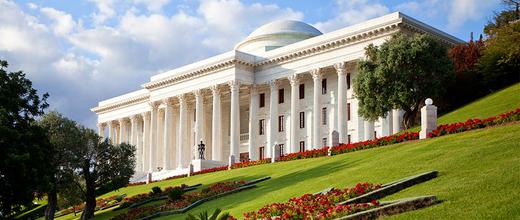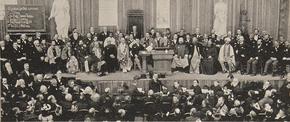The views expressed in our content reflect individual perspectives and do not represent the authoritative views of the Baha'i Faith.
Baha’u’llah’s Kitab-i-Aqdas (the Most Holy Book), his compendium of Baha’i laws, carefully forewarns us early in the work that it is no “mere code of laws:”
Think not that We have revealed unto you a mere code of laws. Nay, rather, We have unsealed the choice Wine with the fingers of might and power. To this beareth witness that which the Pen of Revelation hath revealed. Meditate upon this, O men of insight! – Baha’u’llah, The Most Holy Book, p. 21.
A book of laws that is no mere code of laws might sound like a contradiction in terms, but scholars have pointed out that from the standpoint of legal documents, Baha’u’llah’s Most Holy Book reads more like a constitution than a code of law. From the perspective of a student of literature, the work seems more a moral dialogue or poem than just a legal document.
Structurally, The Most Holy Book proceeds like a variegated tapestry into which Baha’u’llah has woven his expansive vision of a global civilization. That magnificent, world-encompassing vision includes very specific images of the refined individual, the product of a harmonious and well-ordered family, itself an integral part of a spiritually-based and highly organized local and worldwide community.
For instance: the original Arabic word “litafat,” which the English translation of The Most Holy Book renders as “refinement,” has a wide range of meanings with both spiritual and physical implications, such as elegance, gracefulness, cleanliness, civility, politeness, gentleness, delicacy and graciousness, as well as being subtle, refined, sanctified and pure. In accordance with the context of the various passages where it occurs in the Most Holy Book, it has been translated either as “refinement” or “cleanliness.”
Into the fabric of this holistic vision of future society, Baha’u’llah has sprinkled laws, scattering them about like luminescent jewels. Some laws seem to appear in The Most Holy Book almost randomly, as if to shock us into thought. Some establish a theme, after which follows a discourse or meditative exemplum. Other laws conclude a moral commentary, as if to punctuate those themes.
Like the original laws explicated by the prophets and founders of other Faiths, the Baha’i laws set forth by Baha’u’llah in The Most Holy Book apply only to those who have voluntarily become Baha’is. However, unlike the original spiritual guidance given to the followers of previous religions, the Baha’i laws also, as the Introduction says, are intended as the charter of a future world civilization:
To build anew the whole world” is the claim and challenge of His Message, and the Kitab-i-Aqdas is the Charter of the future world civilization that Baha’u’llah has come to raise up. – The Universal House of Justice, Introduction to the Most Holy Book, p. 1.
Because of that unique distinction, and because The Most Holy Book is unparalleled in the history of the world’s great Faiths, it calls our attention to not only its content but also to its intent.
In this series of essays on The Most Holy Book, it will also become apparent as we consider this mighty work that Baha’u’llah’s purpose seems not so much to establish basic rules of comportment (though it certainly does that as well) as it is to set forth overarching spiritual and philosophical models on which future law can be devised and administered. In this context, the laws of The Most Holy Book:
… constitute the kernel of a vast range of law that will arise in centuries to come. This elaboration of the law will be enacted by the Universal House of Justice under the authority conferred upon it by Baha’u’llah Himself. – Ibid., p. 4.
Because the Baha’i teachings say these laws establish a basis for future legal systems, we may well consider that the manner in which the laws are presented is sometimes as important as the specific behavior they ordain.
In his Most Holy Book, Baha’u’llah’s laws set forth paradigms instead of codes. Many laws involve various levels or patterns of response rather than a single specific dictum. Rather than a simplistic “do this” or “do not do that,” the book allows and extols a wide range of praiseworthy human behavior. For example, The Most Holy Book makes daily prayer obligatory, but reveals three different obligatory prayers for that purpose, each one distinctly different from the other two in tone and length. Baha’u’llah then left it to the individual to decide which one to use, without indicating any rank or preference, and he further provided several exemptions from this obligation.
Presumably in the interests of refinement, Baha’u’llah also revealed a law regarding renewing “the furnishings of your homes after the passing of each nineteen years”—which also contains exemptions. – The Most Holy Book, p. 74. After stating the principle behind this law—that God is “desirous of refinement, both for you yourselves and for all that ye possess”—Baha’u’llah states, “Whoso findeth that his means are insufficient to this purpose hath been excused by God, the Ever-Forgiving, the Most Bounteous” – Ibid. As with so many of the Baha’i laws of personal conduct and refinement, the determination of compliance is left to individual judgment and conscience.

















Comments
Sign in or create an account
Continue with Facebookor